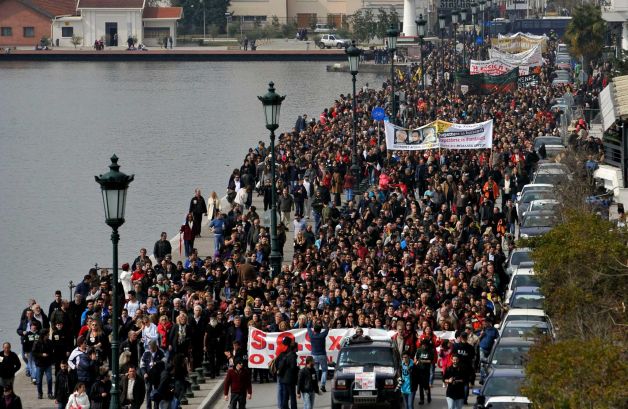About 15,000 people attempted to march on the Canadian consulate in Thessaloniki, Greece this weekend in opposition to Vancouver-based Eldorado Gold mines on the Halkidiki peninsula. Riot police redirected their route away from the consulate.
The Canadian Press reports, “Eldorado vice-president Nancy Woo says activists’ concerns that the mine will pollute the environment are wrong. She says the mine, which is set to begin digging soon, will follow the necessary European Union and Greek environmental rules.”
But Kathimerini.com reports that Yiannis Michelakis, an MP for the party that leads the coalition government in Greece, is suggesting that the concession to Eldorado Gold for the Skouries gold mine should be reviewed. The news agency also notes that Panos Skourletis, a spokesperson for the official opposition party SYRIZA, “said the party would cancel the gold mine contract if it comes to power.”
Canada-European Union free trade
It should be highlighted though that if CETA were to be ratified, Eldorado Gold could challenge Greece through the deal’s investor-state provisions if the Greek government opted to cancel the company’s contract for the controversial and environmentally damaging mines.
Kriton Arsenis, a Greek Member of the European Parliament from Thessaloniki, has been outspoken about the risks that investor-state and the Canada-EU trade deal in particular would have on European communities fighting unwanted resource projects. He has written, “The adverse effect of investor-state dispute settlement clause on environment and public health laws is already evident. In recent years, investor-state arbitration has become a powerful tool giving standing to private commercial entities to bring actions against states in order to circumvent any law restrictions. This clause if finally included in the EU-Canada trade agreement will end up to being an easy way to bypass democracy.”
Arsenis notes, “The problematic nature of the arbitration clause is stressed by the impact assessment of the EU-Canada trade agreement, which was commissioned and financed by the European Commission. The impact assessment concludes that such a clause will not be beneficial environmentally, socially or even economically. Furthermore, it casts doubts as to the utility of the clause between developed countries given the strength of their existing institutional environments. On top of that, it underlines the great threat that it poses to freedom of legislators to legislate in the field of environmental and social policies. On the contrary, it suggests that the best option would be a state-state dispute settlement clause.”
Austerity and the human right to water
And the Associated Press has reported, “There has long been vehement opposition to the prospect of a gold mine and processing plant being built at Skouries in the Halkidiki peninsula, with residents objecting to what they say will be the destruction of pristine forest in the area, leading to the loss of tourism, fishing and farming.” Bloomberg adds, “Gold mining is gathering momentum after Greece began what it called a ‘fast-track’ approvals programme (as an austerity measure).”
To read a report produced by the Blue Planet Project in collaboration with groups in Greece, Spain, Portugal, Italy and Bulgaria on the impact of austerity measures and privatization on the human right to water, please go to http://www.blueplanetproject.net/documents/RTW/RTW-Europe-1.pdf.
For more, please read:
NEWS: 15,000 march on Canadian consulate in Greece in opposition to gold mines
VIDEO: Canadian ambassador defends destructive mine in northern Greece
NEWS: Anti-mine protesters march on Canadian consulate in Thessaloniki, Greece
Arbitration clause in Canada-EU trade agreement



